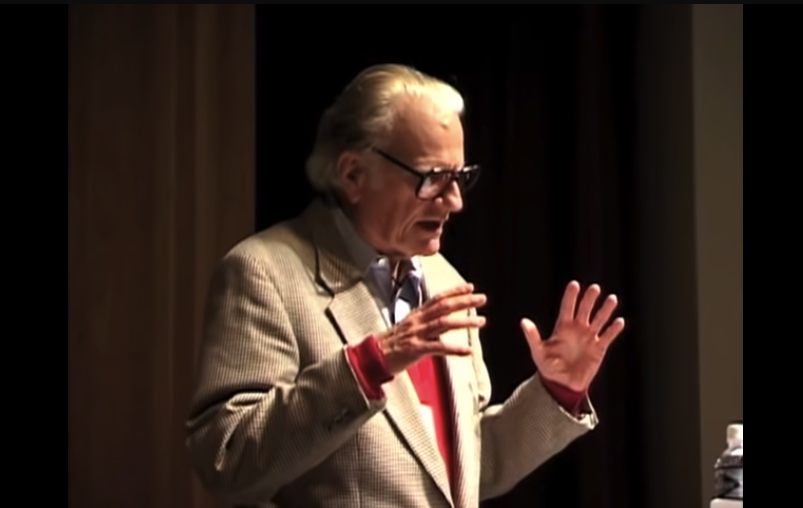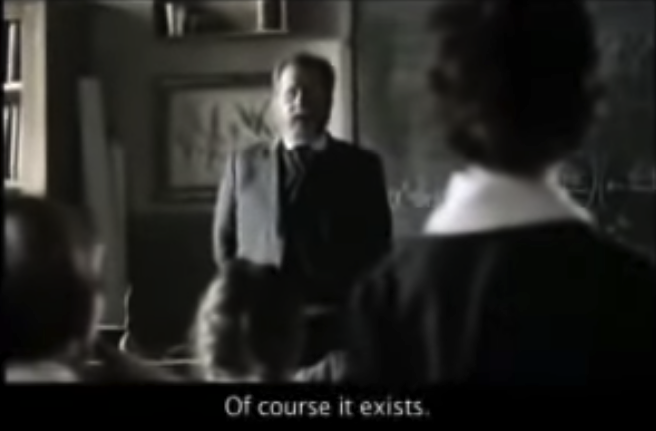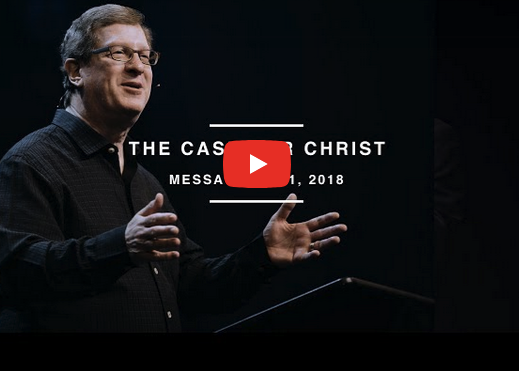“I submit myself, absolutely, to Jesus Christ my Redeemer.” – Blaise Pascal

Technology and Faith Transcript
As a clergyman, you can imagine how out of place I feel. I feel like a fish out of water, or maybe an owl out of the air. (Laughter)
I was preaching in San Jose some time ago, and my friend Mark Kvamme, who helped introduce me to this conference, brought several CEOs and leaders of some of the companies here in the Silicon Valley to have breakfast with me, or I with them. And I was so stimulated. And had such — it was an eye-opening experience to hear them talk about the world that is yet to come through technology and science. I know that we’re near the end of this conference, and some of you may be wondering why they have a speaker from the field of religion. Richard can answer that, because he made that decision.
But some years ago I was on an elevator in Philadelphia, coming down. I was to address a conference at a hotel. And on that elevator a man said, “I hear Billy Graham is staying in this hotel.” And another man looked in my direction and said, “Yes, there he is. He’s on this elevator with us.” And this man looked me up and down for about 10 seconds, and he said, “My, what an anticlimax!”
(Laughter)
I hope — that you won’t feel that these few moments with me is not a — is an anticlimax after all this tremendous talks that you’ve heard, and addresses, of which I intend to listen to every one of them. But I was on an airplane in the East some years ago, and the man sitting across the aisle from me was the mayor of Charlotte, North Carolina. His name was John Belk. Some of you will probably know him. And there was a drunk man on there, and he got up out of his seat two or three times, and he was making everybody upset by what he was trying to do, and he was slapping the stewardess and pinching her as she went by, and everybody was upset with him. And finally, John Belk said, “Do you know who’s sitting here?” And the man said, “No, who?” He said, “It’s Billy Graham, the preacher.” He said, “You don’t say!” And he turned to me, and he said, “Put her there!” He said, “Your sermons have certainly helped me.”
(Laughter)
And I suppose that that’s true with thousands of people.
(Laughter)
I know that as you have been peering into the future, and as we’ve heard some of it here tonight, I would like to live in that age and see what is going to be. But I won’t, because I’m 80 years old; this is my 80th year, and I know that my time is brief. I have phlebitis at the moment in both legs, and that’s the reason that I had to have a little help in getting up here, because I have Parkinson’s disease in addition to that, and some other problems that I won’t talk about.
(Laughter)
But this is not the first time that we’ve had a technological revolution. We’ve had others. And there’s one that I want to talk about. In one generation, the nation of the people of Israel had a tremendous and dramatic change that made them a great power in the Near East. A man by the name of David came to the throne, and King David became one of the great leaders of his generation. He was a man of tremendous leadership. He had the favor of God with him. He was a brilliant poet, philosopher, writer, soldier, with strategies in battle and conflict that people study even today.
But about two centuries before David, the Hittites had discovered the secret of smelting and processing of iron, and slowly, that skill spread. But they wouldn’t allow the Israelis to look into it or to have any. But David changed all of that, and he introduced the Iron Age to Israel. And the Bible says that David laid up great stores of iron, and which archaeologists have found, that in present-day Palestine, there are evidences of that generation. Now, instead of crude tools made of sticks and stones, Israel now had iron plows and sickles and hoes, and military weapons. And in the course of one generation, Israel was completely changed. The introduction of iron, in some ways, had an impact a little bit like the microchip has had on our generation. And David found that there were many problems that technology could not solve.
There were many problems still left. And they’re still with us, and you haven’t solved them, and I haven’t heard anybody here speak to that. How do we solve these three problems that I’d like to mention? The first one that David saw was human evil. Where does it come from? How do we solve it? Over again and again in the Psalms, which Gladstone said was the greatest book in the world, David describes the evils of the human race. And yet he says, “He restores my soul.” Have you ever thought about what a contradiction we are? On one hand we can probe the deepest secrets of the universe and dramatically push back the frontiers of technology, as this conference vividly demonstrates. We’ve seen under the sea, three miles down, or galaxies hundreds of billions of years out in the future.
But on the other hand, something is wrong. Our battleships, our soldiers, are on a frontier now almost ready to go to war with Iraq. Now, what causes this? Why do we have these wars in every generation, and in every part of the world? And revolutions? We can’t get along with other people, even in our own families. We find ourselves in the paralyzing grip of self-destructive habits we can’t break. Racism and injustice and violence sweep our world, bringing a tragic harvest of heartache and death. Even the most sophisticated among us seem powerless to break this cycle. I would like to see Oracle take up that. Or some other technological geniuses work on this. How do we change man so that he doesn’t lie and cheat, and our newspapers are not filled with stories of fraud in business or labor or athletics or wherever?
The Bible says the problem is within us, within our hearts and our souls. Our problem is that we are separated from our Creator, which we call God, and we need to have our souls restored, something only God can do. Jesus said, “For out of the heart come evil thoughts: murders, sexual immorality, theft, false testimonies, slander.” The British philosopher Bertrand Russell was not a religious man, but he said, “It’s in our hearts that the evil lies, and it’s from our hearts that it must be plucked out.” Albert Einstein — I was just talking to someone — when I was speaking at Princeton, and I met Mr. Einstein. He didn’t have a doctor’s degree, because he said nobody was qualified to give him one.
(Laughter)
But he made this statement. He said, “It’s easier to denature plutonium than to denature the evil spirit of man.” And many of you, I’m sure, have thought about that and puzzled over it. You’ve seen people take beneficial technological advances, such as the Internet we’ve heard about tonight, and twist them into something corrupting. You’ve seen brilliant people devise computer viruses that bring down whole systems. The Oklahoma City bombing was simple technology, horribly used. The problem is not technology. The problem is the person or persons using it. King David said that he knew the depths of his own soul. He couldn’t free himself from personal problems and personal evils that included murder and adultery. Yet King David sought God’s forgiveness, and said, “You can restore my soul.”
You see, the Bible teaches that we’re more than a body and a mind. We are a soul. And there’s something inside of us that is beyond our understanding. That’s the part of us that yearns for God, or something more than we find in technology. Your soul is that part of you that yearns for meaning in life, and which seeks for something beyond this life. It’s the part of you that yearns really for God. I find young people all over the world are searching for something. They don’t know what it is. I speak at many universities, and I have many questions and answer periods, and — whether it’s Cambridge or Harvard or Oxford — I’ve spoken at all of those universities. I’m going to Harvard in about three or four — no, it’s about two months from now, to give a lecture. And I’ll be asked the same questions that I was asked the last few times I’ve been there. And it’ll be on these few questions: Where did I come from? Why am I here? Where am I going? What’s life all about? Why am I here?
Even if you have no religious belief, there are times when you wonder that there’s something else. Thomas Edison also said, “When you see everything that happens in the world of science, and in the working of the universe, you cannot deny that there’s a captain on the bridge.” I remember once, I sat beside Mrs. Gorbachev at a White House dinner. I went to Ambassador Dobrynin, whom I knew very well, and I’d been to Russia several times under the Communists, and they’d given me marvelous freedom that I didn’t expect. And I knew Mr. Dobrynin very well, and I said, “I’m going to sit beside Mrs. Gorbachev tonight. What shall I talk to her about?” And he surprised me with the answer. He said, “Talk to her about religion and philosophy. That’s what she’s really interested in.” I was a little bit surprised, but that evening that’s what we talked about, and it was a stimulating conversation, and afterward she said, “You know, I’m an atheist, but I know that there’s something up there higher than we are.”
The second problem that King David realized he could not solve was the problem of human suffering. Writing the oldest book in the world was Job, and he said, “Man is born unto trouble as the sparks fly upward.” Yes, to be sure, science has done much to push back certain types of human suffering. But I’m — in a few months I’ll be 80 years of age. I admit that I’m very grateful for all the medical advances that have kept me in relatively good health all these years. My doctors at the Mayo Clinic urged me not to take this trip out here to this — to be here. I haven’t given a talk in nearly four months. And when you speak as much as I do, three or four times a day, you get rusty. That’s the reason I’m using this podium and using these notes. Every time you ever hear me on the television or somewhere, I’m ad-libbing. I’m not reading. I never read an address. I never read a speech or a talk or a lecture. I talk ad lib. But tonight I’ve got some notes here so that if I begin to forget, which I do sometimes, I’ve got something I can turn to.
But even here among us, most — in the most advanced society in the world, we have poverty. We have families that self-destruct, friends that betray us. Unbearable psychological pressures bear down on us. I’ve never met a person in the world that didn’t have a problem or a worry. Why do we suffer? It’s an age-old question that we haven’t answered. Yet David again and again said that he would turn to God. He said, “The Lord is my shepherd.” The final problem that David knew he could not solve was death. Many commentators have said that death is the forbidden subject of our generation. Most people live as if they’re never going to die. Technology projects the myth of control over our mortality. We see people on our screens. Marilyn Monroe is just as beautiful on the screen as she was in person, and our — many young people think she’s still alive. They don’t know that she’s dead. Or Clark Gable or whoever it is. The old stars. They come to life. And they’re — they’re just as great on that screen as they were in person. But death is inevitable.
I spoke some time ago to a joint session of Congress, last year. And we were meeting in that room, the statue room — about 300 of them were there. And I said, “There’s one thing that we have in common in this room, all of us together, whether Republican or Democrat, or whoever.” I said, “We’re all going to die.” And we have that in common with all these great men of the past that are staring down at us. And it’s often difficult for young people to understand that. It’s difficult for them to understand that they’re going to die. As the ancient writer of Ecclesiastes wrote, he said, there’s every activity under heaven. There’s a time to be born, and there’s a time to die. I’ve stood at the deathbed of several famous people whom you would know. I’ve talked to them. I’ve seen them in those agonizing moments when they were scared to death.
And yet, a few years earlier, death never crossed their mind. I talked to a woman this past week whose father was a famous doctor. She said he never thought of God, never talked about God, didn’t believe in God. He was an atheist. But she said, as he came to die, he sat up on the side of the bed one day, and he asked the nurse if he could see the chaplain. And he said for the first time in his life he’d thought about the inevitable, and about God. Was there a God? A few years ago, a university student asked me, “What is the greatest surprise in your life?” And I said, the greatest surprise in my life is the brevity of life. It passes so fast. But it does not need to have to be that way. Werner von Braun, in the aftermath of World War II concluded, quote: “Science and religion are not antagonists. On the contrary, they’re sisters.” He put it on a personal basis. I knew Dr. von Braun very well. And he said, “Speaking for myself, I can only say that the grandeur of the cosmos serves only to confirm a belief in the certainty of a creator.” He also said, “In our search to know God, I’ve come to believe that the life of Jesus Christ should be the focus of our efforts and inspiration. The reality of this life and His resurrection is the hope of mankind.”
I’ve done a lot of speaking in Germany and in France, and in different parts of the world — 105 countries it’s been my privilege to speak in. And I was invited one day to visit Chancellor Adenauer who was looked upon as sort of the founder of modern Germany since the war. And he once — and he said to me, he said, “Young man,” he said, “Do you believe in the resurrection of Jesus Christ?” And I said, “Sir, I do.” He said, “So do I.” He said, “When I leave office, I’m going to spend my time writing a book on why Jesus Christ rose again, and why it’s so important to believe that.” In one of his plays, Alexander Solzhenitsyn depicts a man dying, who says to those gathered around his bed, “The moment when it’s terrible to feel regret is when one is dying.” How should one live in order not to feel regret when one is dying?
Blaise Pascal asked exactly that question in 17th-century France. Pascal has been called the architect of modern civilization. He was a brilliant scientist at the frontiers of mathematics, even as a teenager. He is viewed by many as the founder of the probability theory, and a creator of the first model of a computer. And of course you are all familiar with the computer language named for him. Pascal explored in depth our human dilemmas of evil, suffering, and death. He was astounded at the phenomenon we’ve been considering: that people can achieve extraordinary heights in science, the arts, and human enterprise, yet they also are full of anger, hypocrisy, and have — and self-hatreds. Pascal saw us as a remarkable mixture of genius and self-delusion. On November 23rd, 1654, Pascal had a profound religious experience. He wrote in his journal these words: “I submit myself, absolutely, to Jesus Christ my Redeemer.”
A French historian said, two centuries later, “Seldom has so mighty an intellect submitted with such humility to the authority of Jesus Christ.” Pascal came to believe not only the love and the grace of God could bring us back into harmony, but he believed that his own sins and failures could be forgiven, and that when he died he would go to a place called heaven. He experienced it in a way that went beyond scientific observation and reason. It was he who penned the well-known words, “The heart has its reasons which reason knows not of.”
Equally well-known is Pascal’s Wager. Essentially he said this: “If you bet on God, and open yourself to His love, you lose nothing even if you’re wrong. But if instead you bet that there is no God, then you can lose it all, in this life and the life to come.” For Pascal, scientific knowledge paled beside the knowledge of God. The knowledge of God was far beyond anything that ever crossed his mind. He was ready to face Him when he died at the age of 39. King David lived to be 70 — a long time in his era. Yet he too had to face death, and he wrote these words: “Even though I walk through the valley of the shadow of death, I will fear no evil, for You are with me.”
This was David’s answer to three dilemmas of evil, suffering and death. It can be yours, as well, as you seek the living God and allow Him to fill your life and give you hope for the future. When I was 17 years of age, I was born and reared on a farm in North Carolina. I milked cows every morning, and I had to milk the same cows every evening when I came home from school, and there were 20 of them that I had — that I was responsible for, and I worked on the farm and tried to keep up with my studies. I didn’t make good grades in high school. I didn’t make them in college, until something happened in my heart.
One day, I was faced face-to-face with Christ. He said, “I am the way, the truth and the life.” Can you imagine that? “I am the truth. I’m the embodiment of all truth.” He was a liar. Or He was insane. Or He was what He claimed to be. Which was He? I had to make that decision. I couldn’t prove it. I couldn’t take it to a laboratory and experiment with it But by faith I said, I believe Him, and He came into my heart and changed my life. And now I’m ready, when I hear that call, to go into the presence of God. Thank you, and God bless all of you.
(Applause)
Thank you for the privilege. It was great.
Richard Wurman: You did it. Thanks [unclear].
(Applause)
Tags:
Billy Graham, Billy Graham on Technology and Faith, Billy Graham on Technology and Faith sermon, Billy Graham on Technology and Faith on Ted, Billy Graham on Technology and Faith preaching, Billy Graham Sermons, Sermons of Billy Graham, Technology and Faith Billy Graham, Christian sermons, christian talk, christian preacher



